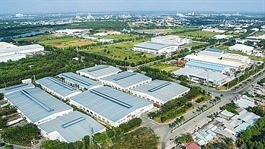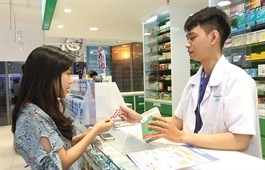Local pharma sector to benefit from EU connection
Local pharma sector to benefit from EU connection
Despite lower-than-expected growth, Vietnam’s pharmaceutical market performed better than other global markets in the past 12 months. Magdalena Krakowiak, chairwoman of the International Quality Medicines’ Generic and Biosimilar Sector Committee (IQMED) at the European Chamber of Commerce in Vietnam, writes about 2020 results and future prospects thanks to the EU-Vietnam Free Trade Agreement.

Magdalena Krakowiak, chairwoman of the International Quality Medicines’ Generic and Biosimilar Sector Committee (IQMED) at the European Chamber of Commerce in Vietnam
|
In 2020, Vietnam’s pharmaceutical market grew around 4 per cent compared to the previous year. The growth was, however, lower than predicted. But bearing in mind the pandemic, it was still a great result compared to other world markets. While the EU, the United States, and other countries have struggled to find a coherent response to the COVID-19 outbreak, Vietnam’s government took strict measures to stop it effectively.
The industry faced two different types of challenges – reduced procedures due to patients refraining from visiting hospitals as well as logistical challenges due to the reduced flow of goods and workforce. These circumstances supported a digital revolution in the pharmaceutical industry, shifting educational programmes for healthcare professionals from offline to online. Foreign experts continued to provide education for Vietnamese healthcare professionals. Most importantly, pharmaceutical businesses could maintain production stability. Companies put in place comprehensive business continuity and risk management plans to avoid a shortage of drugs and deal with the negative global impact on the supply chain.
Despite the unpredictability of the pandemic, the pharmaceutical market in Vietnam is expected to continue growing significantly in terms of both capacity and value. In addition, the EU-Vietnam Free Trade Agreement (EVFTA) has unlocked more opportunities, both for overseas as well as domestic companies.
With the EVFTA in effect, approximately half of EU pharmaceutical imports are now duty free, with the rest exempted after seven years. Foreign pharmaceutical companies are allowed to establish foreign-invested enterprises to sell pharmaceuticals imported by them to distributors or wholesalers, build their own warehouses, provide information to healthcare practitioners and do clinical studies and testing.
There are also changes in terms of intellectual property rights brought by the EVFTA. The regulatory data protection has been established for pharmaceutical products for five years and a patent protection is extended up to two years (if the approval process takes more than 24 months). The existing clinical trial requirements on ethnicity have been withdrawn due to their lack of compliance with international standards.
Probably the most important benefit of the EVFTA is the controlling mechanism against the protectionism of local governments. As much as we understand the government’s rationale behind the aim of increasing the share of locally-produced pharmaceuticals to 80 per cent, one has to remember that Vietnam’s pharma industry still relies on imports, as domestic output can only meet around half of the total demand.
Therefore, our industry still needs more incentives for further investment in Vietnam as well as a stable legal framework.
Foreign pharmaceutical companies bring innovative and traditional medicines in improved application forms – such as pre-filled syringes and sublingual tablets – and other high-quality generics to Vietnam.
This results in the availability of improved additional treatment options for Vietnamese patients and doctors, which leads to additional benefits for healthcare budgets as well as direct and indirect pharmaceutical spending.
The IQMED Generic and Biosimilar Sector Committee was established in 2016. With the aim of pooling viewpoints and superior practices towards providing solutions for an affordable, high-quality and sustainable supply source for branded generic drugs in Vietnam, the committee has created a platform where issues and solutions can be discussed among like-minded business professionals in the industry. At IQMED, we welcome several legal changes made recently by the Ministry of Health. The situation leading to thousands of pending market authorisations has been temporarily solved after addressing the issue at the top authorities’ level. However, further analysis and potential streamlining of the drug registration policy in Vietnam is required, particularly in avoiding creating new barriers to import.
We see further potential to maximise benefits arising from the EVFTA for all participating countries in three main areas.
Firstly, all EU member states need to be treated equally in the regulations of Vietnam. Secondly, the registration process of medicinal products within the Vietnamese market should be strictly aligned with international standards. And thirdly, to increase patient safety as well as create a sustainable framework for operations, international codes of ethics and business integrity must be applied.
These changes will support Vietnam to become even more sustainable and a desired investment destination for foreign firms with benefits for a flourishing domestic market.
























